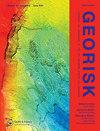Real-time tunnel lining crack detection based on an improved You Only Look Once version X algorithm
IF 4.8
3区 工程技术
Q1 ENGINEERING, GEOLOGICAL
Georisk-Assessment and Management of Risk for Engineered Systems and Geohazards
Pub Date : 2023-01-02
DOI:10.1080/17499518.2023.2172187
引用次数: 3
Abstract
ABSTRACT To solve slow speed and low accuracy of traditional detection methods of tunnel lining cracks, especially under the complicated situation of tunnel in operation, this work proposed an improved You Only Look Once version X (YOLOX) tunnel lining crack image detection algorithm. First, Mobilenetv3 was used to replace YOLOX’s CSPDarknet network. The Efficient Channel Attention (ECA) module was then added to the enhanced feature extraction network, and the IOU loss function was replaced by the generalised IOU (GIOU) loss function. A tunnel crack image data set was constructed and used to compare the performance of the improved YOLOX algorithm with that of five other algorithms. The improved YOLOX algorithm solves the shortcomings of the other five algorithms. The results showed that the improved YOLOX algorithm had 82.48% F1 score and 87.28% AP value, which is higher than that of the other five algorithms at varying degrees. In addition, the data size of the improved YOLOX model was 51.2 M, which is 75.27% compressed compared to the YOLOX model. The time was 16.52 ms, and the FPS was 60.52 frames/s. Therefore, the proposed improved YOLOX algorithm can realise the high-speed, high-precision, real-time dynamic detection of tunnel lining cracks in complicated environments.基于改进的You Only Look Once version X算法的隧道衬砌实时裂缝检测
针对传统隧道衬砌裂缝检测方法速度慢、精度低的问题,特别是在隧道运行复杂的情况下,本文提出了一种改进的You Only Look Once version X (YOLOX)隧道衬砌裂缝图像检测算法。首先,Mobilenetv3被用来取代YOLOX的CSPDarknet网络。然后将有效通道注意(ECA)模块添加到增强的特征提取网络中,并将IOU损失函数替换为广义IOU (GIOU)损失函数。构建了隧道裂缝图像数据集,并将改进的YOLOX算法与其他五种算法的性能进行了比较。改进的YOLOX算法解决了其他五种算法的不足。结果表明,改进后的YOLOX算法F1得分为82.48%,AP值为87.28%,不同程度地高于其他5种算法。此外,改进YOLOX模型的数据量为51.2 M,与YOLOX模型相比压缩了75.27%。时间为16.52 ms,帧数为60.52帧/秒。因此,本文提出的改进YOLOX算法可以实现复杂环境下隧道衬砌裂缝的高速、高精度、实时动态检测。
本文章由计算机程序翻译,如有差异,请以英文原文为准。
求助全文
约1分钟内获得全文
求助全文
来源期刊
CiteScore
8.70
自引率
10.40%
发文量
31
期刊介绍:
Georisk covers many diversified but interlinked areas of active research and practice, such as geohazards (earthquakes, landslides, avalanches, rockfalls, tsunamis, etc.), safety of engineered systems (dams, buildings, offshore structures, lifelines, etc.), environmental risk, seismic risk, reliability-based design and code calibration, geostatistics, decision analyses, structural reliability, maintenance and life cycle performance, risk and vulnerability, hazard mapping, loss assessment (economic, social, environmental, etc.), GIS databases, remote sensing, and many other related disciplines. The underlying theme is that uncertainties associated with geomaterials (soils, rocks), geologic processes, and possible subsequent treatments, are usually large and complex and these uncertainties play an indispensable role in the risk assessment and management of engineered and natural systems. Significant theoretical and practical challenges remain on quantifying these uncertainties and developing defensible risk management methodologies that are acceptable to decision makers and stakeholders. Many opportunities to leverage on the rapid advancement in Bayesian analysis, machine learning, artificial intelligence, and other data-driven methods also exist, which can greatly enhance our decision-making abilities. The basic goal of this international peer-reviewed journal is to provide a multi-disciplinary scientific forum for cross fertilization of ideas between interested parties working on various aspects of georisk to advance the state-of-the-art and the state-of-the-practice.

 求助内容:
求助内容: 应助结果提醒方式:
应助结果提醒方式:


